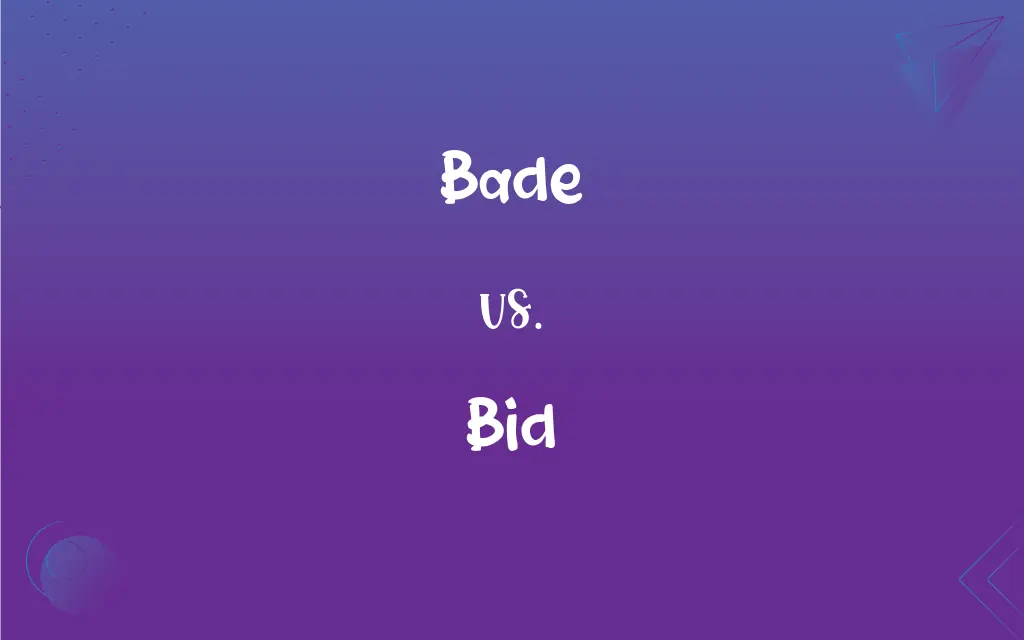Bade vs. Bid: What's the Difference?
By Aimie Carlson & Harlon Moss || Updated on May 22, 2024
"Bade" is the past tense of "bid" used in older or literary contexts, while "bid" is a verb meaning to offer a price or to command. "Bid" is also used in both present and past tenses in contemporary language.

Key Differences
"Bade" is an archaic or literary term, serving as the past tense of "bid." It's primarily seen in older texts or poetic contexts. For example, "He bade farewell to his friends" demonstrates its usage. This form is rarely used in modern English, where simpler structures are preferred. On the other hand, "bid" functions as both the present and past tense of the verb in contemporary usage. It means to offer a certain price for something, as in auctions or sales. For example, "She bid $100 for the painting" illustrates its present tense form. As the past tense, it can be used like, "He bid farewell yesterday."
While "bade" is rooted in tradition and less frequently seen today, "bid" adapts to different contexts easily. This makes "bid" more practical for regular communication, while "bade" remains mostly in literary and historical contexts.
In contemporary speech and writing, "bid" continues to be used actively and dynamically. Meanwhile, "bade" appears predominantly in reflective, poetic, or nostalgic settings, maintaining a connection to older forms of the English language.
Comparison Chart
Grammar
Past tense of "bid" (archaic)
Present and past tense verb
Usage
Primarily in older or literary texts
Common in contemporary language
ADVERTISEMENT
Context
Historical, poetic
Auctions, commands, attempts
Versatility
Limited
High
Example Sentence
He bade farewell to his friends.
She bid $100 for the painting.
Bade and Bid Definitions
Bade
Gave a command.
He bade them be silent.
Bid
Command someone.
He bid them to follow him.
ADVERTISEMENT
Bade
Invited someone.
He bade her enter the room.
Bid
Attempt to achieve something.
He made a bid for the presidency.
Bade
Directed someone.
The king bade the knight rise.
Bid
To offer or propose (an amount) as a price.
Bade
Past tense of bid in historical texts.
She bade her guests welcome.
Bid
To auction (a contract)
The city will bid the project next summer.
Bade
Expressed a farewell.
They bade him goodbye.
Bid
To offer (someone) membership, as in a group or club
"glancing around to be sure that he had been bid by a society that he wanted" (Louis Auchincloss).
Bade
A past tense of bid.
Bid
(Games) To state one's intention to take (tricks of a certain number or suit in cards)
Bid four hearts.
Bade
A form of the past tense of Bid.
Bid
To utter (a greeting or salutation)
I bid you farewell.
Bade
A Chadic language spoken in northern Nigeria
Bid
To issue a command to; direct
"Lee ... bid the captain sit beside him and report" (Stephen W. Sears).
Bid
To invite to attend; summon
The host bid the guests come to dinner.
Bid
To make an offer to pay or accept a specified price
Decided not to bid on the roll-top desk.
Bid
To seek to win or attain something; strive.
Bid
An offer to pay a certain amount of money for something
Made a bid on the antique desk.
Bid
The amount offered or proposed
The highest bid at the auction was $5,000.
Bid
An invitation, especially one offering membership in a group or club.
Bid
An earnest effort to win or attain something
A team in a bid to win the championship.
A candidate who made a bid for the presidency.
Bid
The act of bidding in cards.
Bid
The number of tricks or points declared.
Bid
The trump or no-trump declared.
Bid
The turn of a player to bid.
Bid
(transitive) To issue a command; to tell.
He bade me come in.
Bid
(transitive) To invite; to summon.
She was bidden to the wedding.
Bid
(transitive) To utter a greeting or salutation.
Bid
(intransitive) To make an offer to pay or accept a certain price.
Have you ever bid in an auction?
Bid
(transitive) To offer as a price.
She bid £2000 for the Persian carpet.
Bid
(intransitive) To make an attempt.
He was bidding for the chance to coach his team to victory once again.
Bid
To announce (one's goal), before starting play.
Bid
(obsolete) To proclaim (a bede, prayer); to pray.
Bid
To take a particular route regularly.
I can't believe he bid the Syracuse turn; that can be brutal in the winter!
Bid
An offer at an auction, or to carry out a piece of work.
His bid was $35,000.
A bid for a lucrative transport contract
Bid
(ultimate frisbee) A (failed) attempt to receive or intercept a pass.
Nice bid!
Bid
An attempt, effort, or pursuit (of a goal).
Their efforts represented a sincere bid for success.
She put in her bid for the presidency.
He put in his bid for office.
Bid
(trucking) A particular route that a driver regularly takes from their domicile.
I can't stand this new bid I'm on, even if the mileage is better.
Bid
(prison slang) A prison sentence.
Bid
To make an offer of; to propose. Specifically : To offer to pay ( a certain price, as for a thing put up at auction), or to take (a certain price, as for work to be done under a contract).
Bid
To offer in words; to declare, as a wish, a greeting, a threat, or defiance, etc.; as, to bid one welcome; to bid good morning, farewell, etc.
Neither bid him God speed.
He bids defiance to the gaping crowd.
Bid
To proclaim; to declare publicly; to make known.
Bid
To order; to direct; to enjoin; to command.
That Power who bids the ocean ebb and flow.
Lord, if it be thou, bid me come unto thee.
I was bid to pick up shells.
Bid
To invite; to call in; to request to come.
As many as ye shall find, bid to the marriage.
Bid
To pray.
Bid
To make a bid; to state what one will pay or take.
Bid
An offer of a price, especially at auctions; a statement of a sum which one will give for something to be received, or will take for something to be done or furnished; that which is offered.
Bid
An authoritative direction or instruction to do something
Bid
An attempt to get something;
They made a futile play for power
He made a bid to gain attention
Bid
A formal proposal to buy at a specified price
Bid
(bridge) the number of tricks a bridge player is willing to contract to make
Bid
Propose a payment;
The Swiss dealer offered $2 million for the painting
Bid
Invoke upon;
Wish you a nice evening
Bid farewell
Bid
Ask for or request earnestly;
The prophet bid all people to become good persons
Bid
Make a demand, as for a card or a suit or a show of hands;
He called his trump
Bid
Make a serious effort to attain something;
His campaign bid for the attention of the poor population
Bid
Ask someone in a friendly way to do something
Bid
Offer a price.
He bid $50 for the vase.
Bid
Make an effort.
She bid to win the race.
Bid
Invite someone formally.
They bid us to their wedding.
FAQs
Is "bade" still used in modern English?
It is rare in modern English and primarily found in literary or historical contexts.
Can "bid" be used in past tense?
Yes, "bid" can be used as both the present and past tense in contemporary English.
What is the present tense of "bade"?
The present tense of "bade" is "bid."
How is "bade" pronounced?
"Bade" is pronounced as /bæd/ or /beɪd/.
What does "bid" mean?
"Bid" means to offer a price, make an attempt, or command someone.
Is "bade" more formal than "bid"?
Yes, "bade" tends to be more formal and archaic compared to "bid."
Is "bid" used in auctions?
Yes, "bid" is commonly used in the context of auctions to offer a price.
Can "bid" mean to invite?
Yes, "bid" can mean to invite someone formally.
What does "bade farewell" mean?
It means to say goodbye or take leave in a formal way.
What does "bade" mean?
"Bade" is the past tense of "bid," commonly used in older or literary texts.
How common is "bade" in everyday language?
"Bade" is uncommon in everyday language and mostly found in older texts.
Can "bid" be used as a noun?
Yes, "bid" can be a noun, meaning an offer or attempt.
What is the plural form of "bid"?
"Bid" does not have a plural form as a verb, but as a noun, it is "bids."
Are "bade" and "bid" interchangeable?
No, they are not interchangeable; "bade" is specifically past tense and more formal, while "bid" is versatile.
Where is "bade" typically used?
"Bade" is typically used in historical, literary, or poetic contexts.
Is "bade" considered old-fashioned?
Yes, "bade" is considered old-fashioned in modern English.
What is the etymology of "bade"?
"Bade" comes from Old English "bēodan," meaning to command or offer.
What is the past participle of "bid"?
The past participle of "bid" is also "bid."
What is an example of "bid" as a command?
E.g., "He bid them to proceed with caution."
Does "bid" have other forms?
Yes, "bidding" is the present participle form.
About Author
Written by
Aimie CarlsonAimie Carlson, holding a master's degree in English literature, is a fervent English language enthusiast. She lends her writing talents to Difference Wiki, a prominent website that specializes in comparisons, offering readers insightful analyses that both captivate and inform.
Co-written by
Harlon MossHarlon is a seasoned quality moderator and accomplished content writer for Difference Wiki. An alumnus of the prestigious University of California, he earned his degree in Computer Science. Leveraging his academic background, Harlon brings a meticulous and informed perspective to his work, ensuring content accuracy and excellence.































































